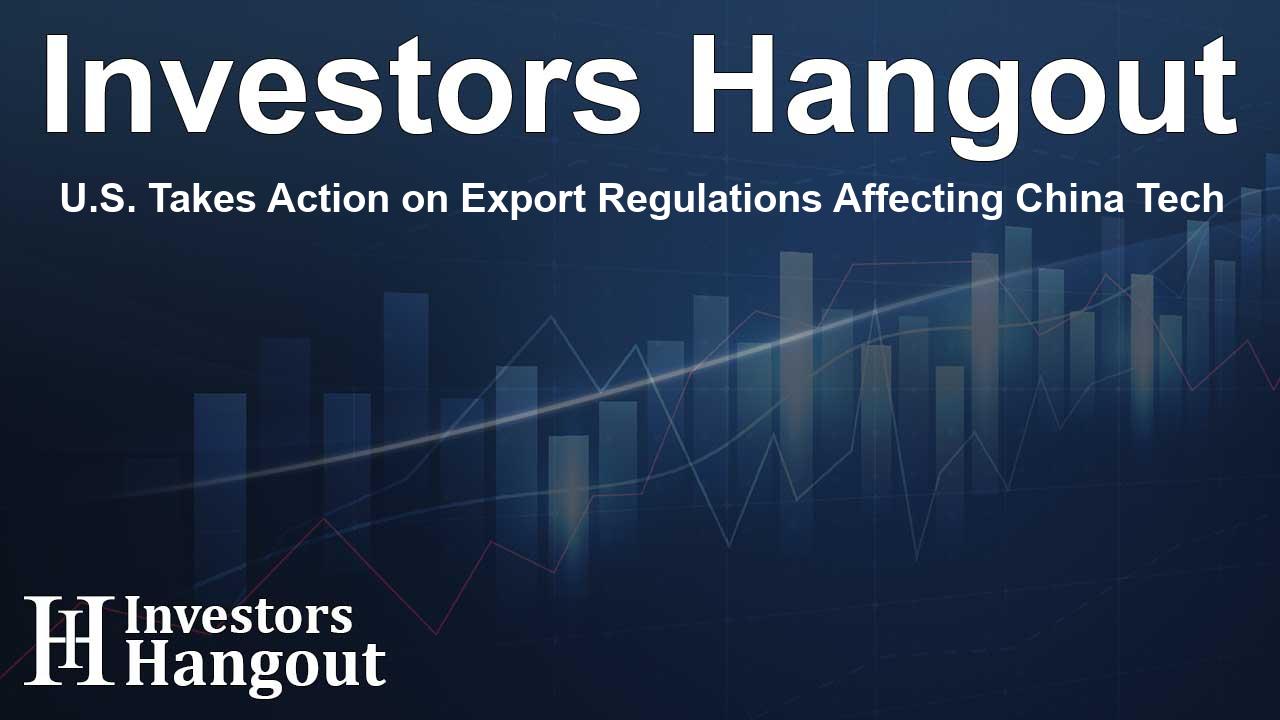U.S. Takes Action on Export Regulations Affecting China Tech

U.S. Implements Stricter Export Controls Targeting Chinese Tech
The U.S. government has moved to tighten export controls on Chinese companies engaged primarily in the semiconductor industry. This step aims to slow down China's progress in technology, affecting the competitive landscape heavily.
Details of the New Export Regulations
Recent changes announced by the U.S. Department of Commerce involve adding subsidiaries of entities on the government’s “entity list” to a blacklist, thereby increasing restrictions on exports. This list includes foreign entities that require U.S. companies to procure a license before any export.
Application of the New Rules
The regulations apply specifically to businesses that are at least 50% owned by entities listed on the blacklist. Though it primarily impacts Chinese subsidiaries, it does not single out China solely.
Impact on Chinese Semiconductor Companies
Notably, Chinese chipmakers such as Huawei and Semiconductor Manufacturing International Corporation (SMIC) are significantly affected, as they face challenges in accessing advanced technology. This regulatory shift reflects ongoing concerns regarding foreign acquisition of U.S. innovations which could enhance military capabilities.
Community Responses to Regulatory Changes
Experts have recognized the implications of these new export rules, with voices from various sectors sharing their perspectives. Chris McGuire, a former National Security Council official, noted that this adjustment was necessary to fix previous weaknesses in the export control system.
Agreement on the Shift
Gregory Allen, an export control expert at a prominent think tank, emphasized the significance of this regulatory change, referring to it as a "massive change" in the approach to international trade controls.
Reactions from China
In stark contrast, China's response has been overwhelmingly critical. The Chinese commerce ministry labeled the new laws as “extremely malicious” and accused the U.S. of overplaying national security concerns as a blanket justification for these intensified controls.
Nvidia's Perspective on Market Impact
The recent export controls coincide with a period of heightened scrutiny over China's technological advancements, notably affecting companies such as Nvidia (NASDAQ: NVDA). This well-recognized company has been vocal about how these regulations may unintentionally advantage Chinese competitors.
Potential Backfiring on U.S. Firms
Nvidia's CEO, Jensen Huang, has warned that these stiffer export controls could push domestic rivals like Huawei into a stronger market position, potentially reversing the intended effects of these regulatory measures.
Concerns Regarding AI Competition
In discussions surrounding artificial intelligence, David Sacks, a key figure in the White House's endeavors, cautioned that restricting companies like Nvidia from global sales could allow Chinese companies to leap ahead in the race for AI supremacy.
Conclusion and Future Implications
The U.S. government's latest export controls represent a significant pivot in how trade is conducted in the technology sector, especially towards China. With companies like Nvidia at the center of this discussion, the impact of these new regulations will likely shape the tech landscape for years to come.
Frequently Asked Questions
What are the new export controls implemented by the U.S.?
The new export controls automatically add subsidiaries of companies on an entity list to a blacklist, which requires U.S. firms to get licenses before exporting.
Which companies are primarily affected by these regulations?
Companies like Huawei and Semiconductor Manufacturing International Corporation (SMIC) are among those that will feel the most significant impact.
How has China reacted to the new export controls?
China's commerce ministry has described the regulations as "extremely malicious" and criticized the U.S. for its national security narrative.
What are the potential implications for U.S. firms?
Firms like Nvidia may face increased competition from Chinese companies as export restrictions could hinder their operations, inadvertently aiding rivals.
How might these changes affect global technology competition?
The restrictions could shift the balance in the global tech race, especially in areas like AI, where companies are vying for dominance.
About The Author
Contact Henry Turner privately here. Or send an email with ATTN: Henry Turner as the subject to contact@investorshangout.com.
About Investors Hangout
Investors Hangout is a leading online stock forum for financial discussion and learning, offering a wide range of free tools and resources. It draws in traders of all levels, who exchange market knowledge, investigate trading tactics, and keep an eye on industry developments in real time. Featuring financial articles, stock message boards, quotes, charts, company profiles, and live news updates. Through cooperative learning and a wealth of informational resources, it helps users from novices creating their first portfolios to experts honing their techniques. Join Investors Hangout today: https://investorshangout.com/
The content of this article is based on factual, publicly available information and does not represent legal, financial, or investment advice. Investors Hangout does not offer financial advice, and the author is not a licensed financial advisor. Consult a qualified advisor before making any financial or investment decisions based on this article. This article should not be considered advice to purchase, sell, or hold any securities or other investments. If any of the material provided here is inaccurate, please contact us for corrections.
